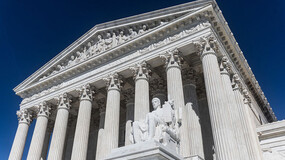
Professor Hathaway Named 2025 Guggenheim Fellow
Professor Oona Hathaway ’97 has been named a 2025 Guggenheim Fellow, one of 198 artists and scholars to be recognized this year across 53 fields.

Podcast: Anika Singh Lemar Confronts Connecticut’s Housing Crisis
Clinical Professor of Law Anika Singh Lemar talks about the struggle to build more affordable housing in Connecticut and the three clinics she leads at the Law School that work on housing issues.

Free Exercise Clinic’s Amicus Brief Quoted at SCOTUS Oral Argument
An amicus brief by the Yale Law School Free Exercise Clinic was quoted during oral argument before the U.S. Supreme Court earlier this term.

Soros Fellowship for New Americans Announces 2025 Recipients
Four current Yale Law School students and one incoming student have been named 2025 recipients of the Paul & Daisy Soros Fellowship for New Americans.

Rule of Law Clinic Represents 27 Former Senior Government Officials in Amicus Brief
The Rule of Law clinic represents 27 former national security, foreign policy, intelligence, and other public officials in an amicus brief supporting the Perkins Coie law firm.

MFIA Clinic Wins Temporary Restraining Order in Voice of America Case
A federal judge issued a temporary restraining order prohibiting the Trump administration from taking further steps to silence Voice of America, a government-funded broadcaster with an audience of over 300 million people around the world.

Criminal Justice Advocacy Clinic Bill Advances Out of CT Joint Judiciary Committee
A bill drafted by a coalition including the Criminal Justice Advocacy Clinic successfully passed out of the Joint Judiciary Committee of the Connecticut legislature.

Professor Rodríguez Co-Hosts New Podcast on Immigration Policies
Professor Cristina Rodríguez ’00 has launched a new podcast with colleagues from the New School and UCLA School of Law that examines the immigration policies of the Trump administration and their impact.




